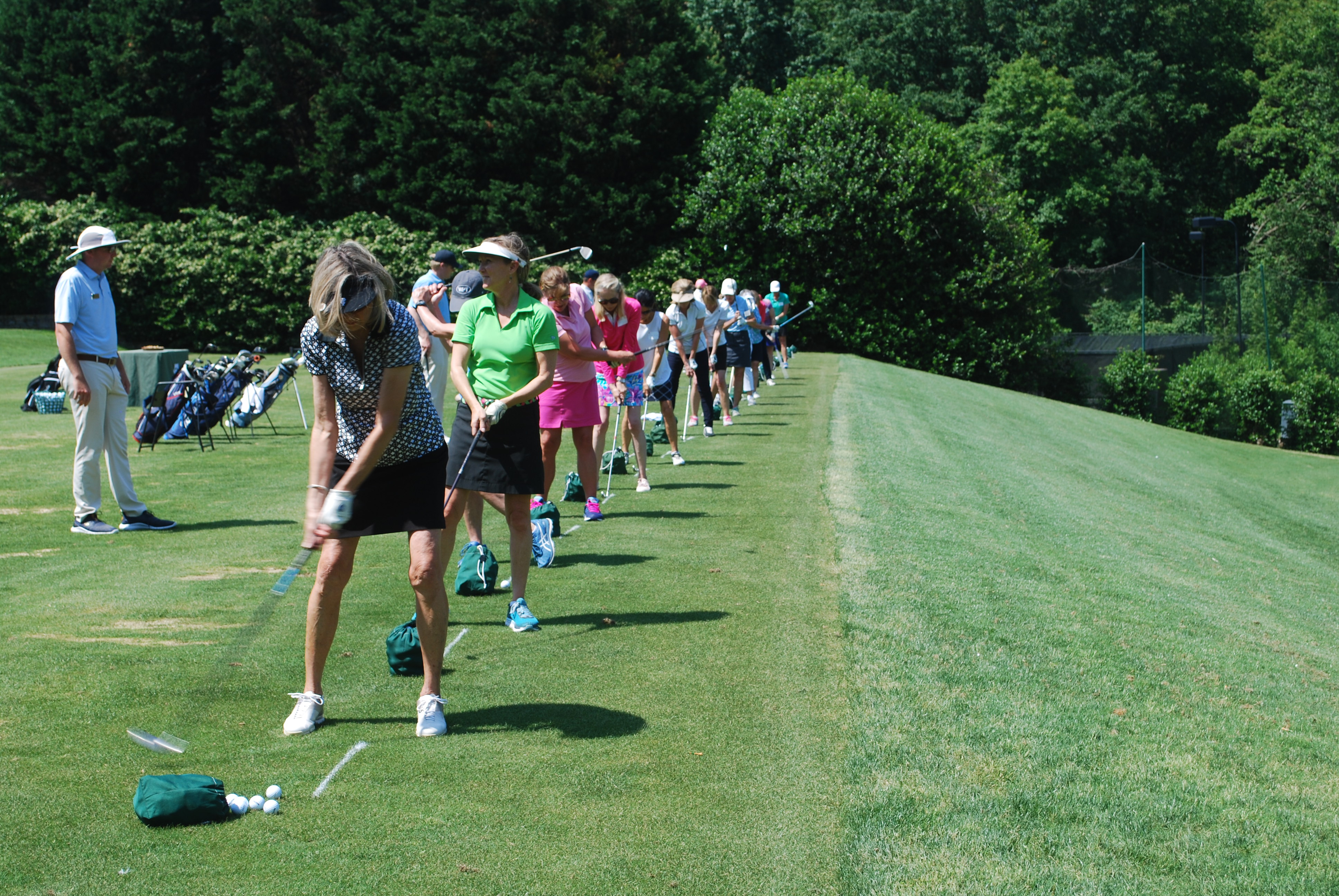
5th Annual Birdies & Brunch
September 24, 2024 - Maple Chase Golf and Country Club
Thank You to our Sponsors!
Women-powered 4th Annual Birdies & Brunch raises funds for Last Dollar Grants
Crosby Scholars’ 4th annual Birdies & Brunch raised more than $50,000 thanks to presenting sponsor Flow Lexus, other sponsors and nearly 100 women who supported the event at Maple Chase Golf and Country Club on September 19th.
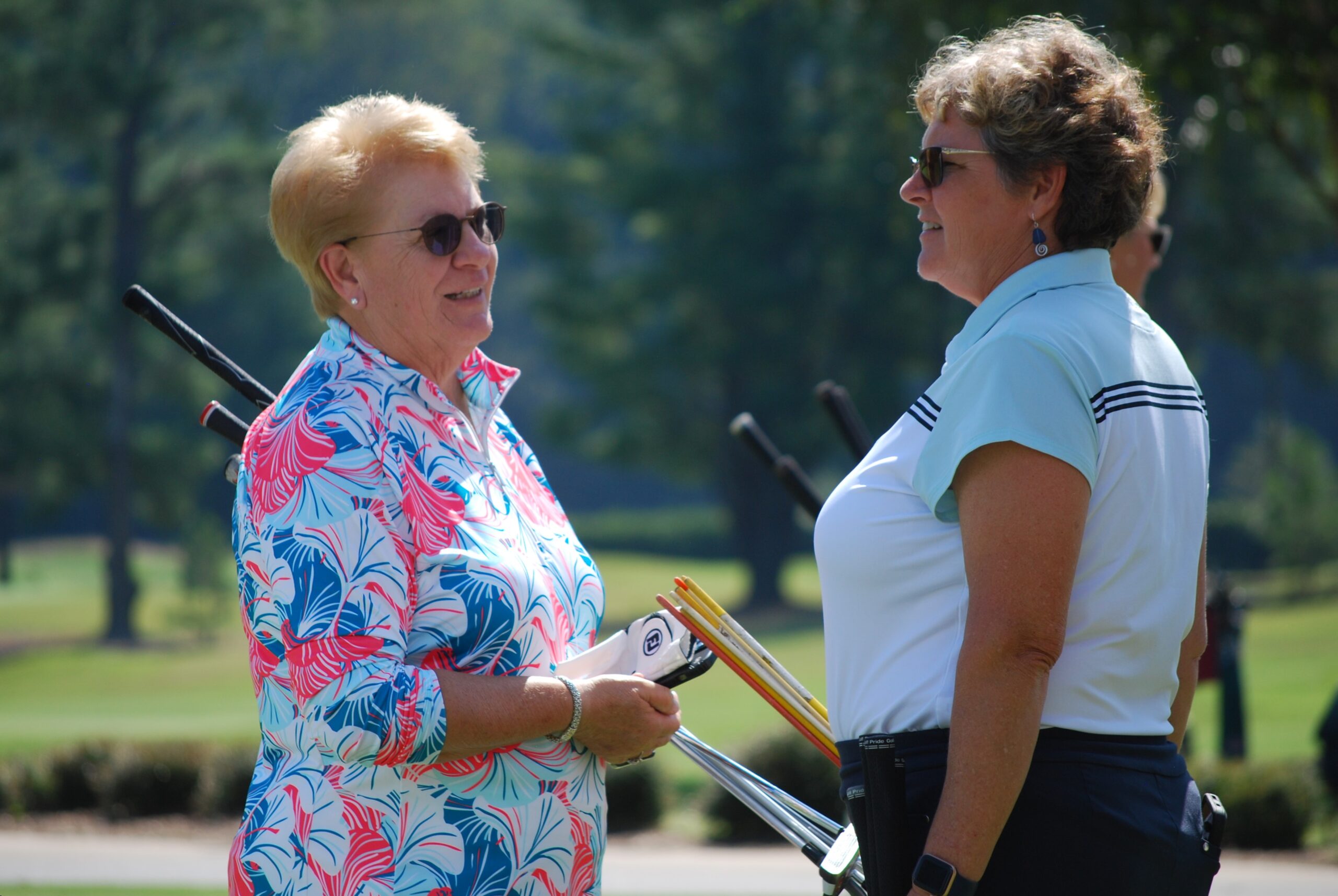
The women-only Birdies & Brunch began as a way to increase awareness of the impact of the
Crosby Scholars Program with an added bonus that funds raised by a silent auction support Last Dollar Grants for students with unmet financial need to enroll in college.
Crosby’s President & CEO Mona Lovett provided an overview of how the Program began, thanks to Kathryn Crosby’s decision to move The Crosby Pro Am to Bermuda Run in the 1980s.
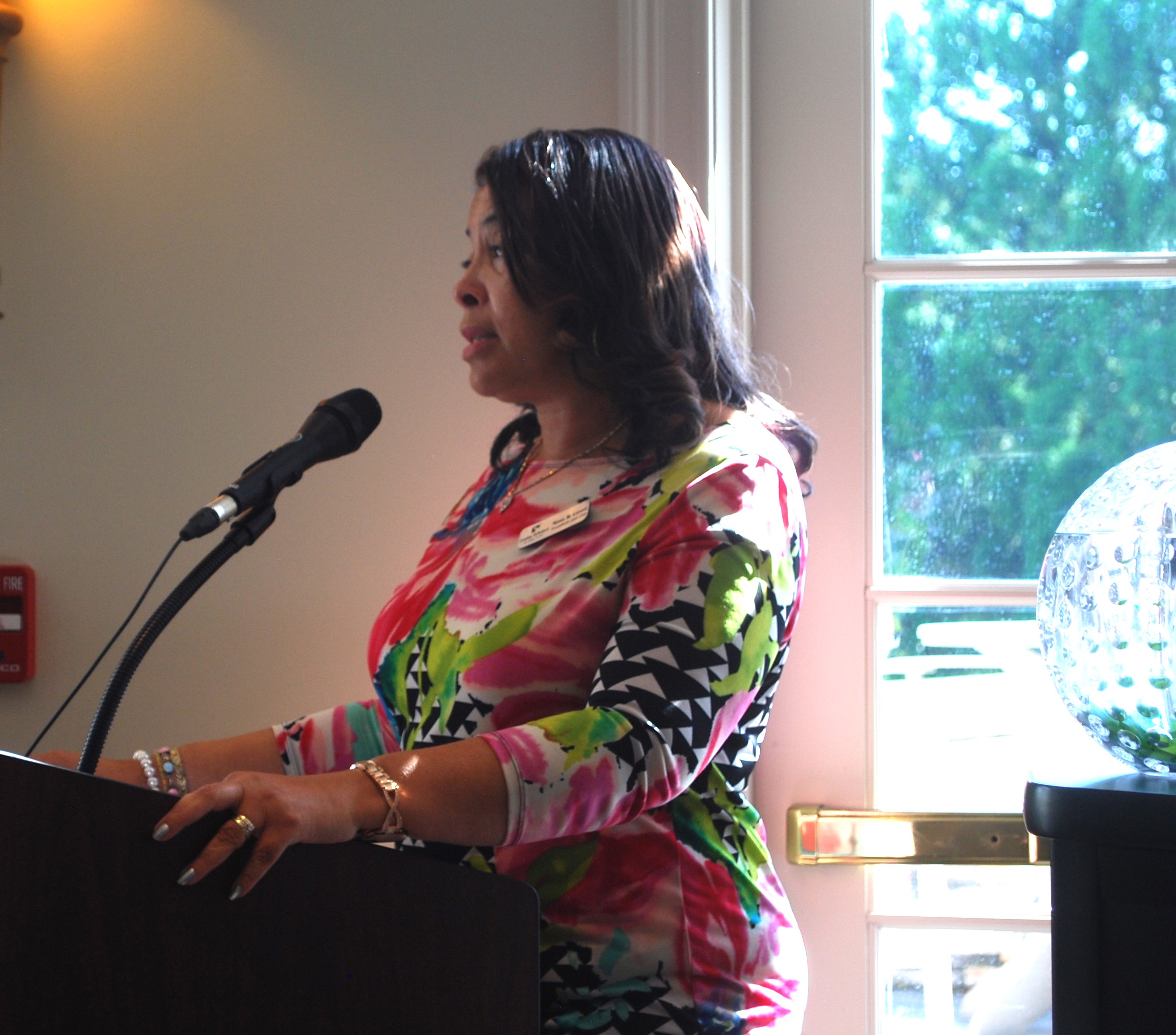
“The legacy of having this program here is we can help prepare our young people for college,” Lovett said. Crosby Scholars began in two high-need high schools in 1992, and now serves students in every public middle and high school in Winston-Salem/Forsyth County Schools.
“We want to make sure we are available to every student,” Lovett said, adding that Crosby offers focused programs for first-generation and under-represented students. Crosby Scholars serves more than 10,000 6th-12th-grade students annually, and in 2023, 100% of Crosby’s 1,054 seniors graduated from high school and enrolled in 140 different colleges and other post-secondary educational opportunities. To support students’ goals, Crosby Scholars awarded $930,000 in Last Dollar Grants and scholarships; 68% of Last Dollar grant recipients are Pell-eligible, which means they have the greatest financial need.
However, Crosby Scholars’ benefits extend beyond funding, Lovett said, and include providing hands-on assistance with completion of the Free Application for Federal Student Aid (FAFSA), which is required to be eligible for financial aid, as well as one-on-one college advising for each junior and senior. Students learn about time management, leadership, test prep and more through Crosby’s required academies, and they participate in college visits. Students must complete community service each year, and seniors in 2023 completed more than 45,000 hours of community service. Lovett said the experience not only involves students in the community, but also lets “every person know they have value, and they can contribute. That lifts everyone up. We are able to grow and thrive and move forward through them. Young people learn their voices can be heard.”
Crosby Scholars also offers focused outreach programming for African American and Hispanic/Latino students, including Crosby Club for middle-schoolers, African American Males Pursuing Educational Dreams (AAMPED), Excelencia for Latina girls, Hispanic Latino Males Success Program (HLMSP) and The SHE Project: SHOW, HELP, EMPLOY, which introduces African American and Hispanic/Latina girls to STEM careers. Crosby also received a grant from Blue Cross North Carolina for programming for children in foster care.
Crosby Alum Evita Valdez, a marketing account manager at Flow Automotive, said that Crosby Scholars played a vital role in her and her brother’s success. Their parents moved to the United States from Mexico when they were teens, and they met in Winston-Salem. They were filled with hopes and dreams for their children, she said.
“At the top of their list was providing for my brother and me to go to college,” Valdez said. “They had no idea where to start,” until their 6th-grade daughter came home with a Crosby Scholars flyer. Crosby Scholars provided many ways in which she and her brother and parents became involved in preparing for college.
“It was like they were doing it with us, and it was so empowering,” said Valdez, who graduated from Appalachian State University in 2018, the first person in her entire extended family to graduate from college.
“Crosby Scholars made the process as easy as it could have been for us,” she said, “and helped my brother and I to determine we wanted to be a part of Winston-Salem.”
Winston-Salem’s Mayor Pro Tempore D.D. Adams noted the City of Winston-Salem awarded COVID-relief funds to support Crosby Scholars’ new dashboard and portal system, which is key infrastructure for the Crosby Program.
“We invested in the future of our city by investing in the future of our children,” Adams said.
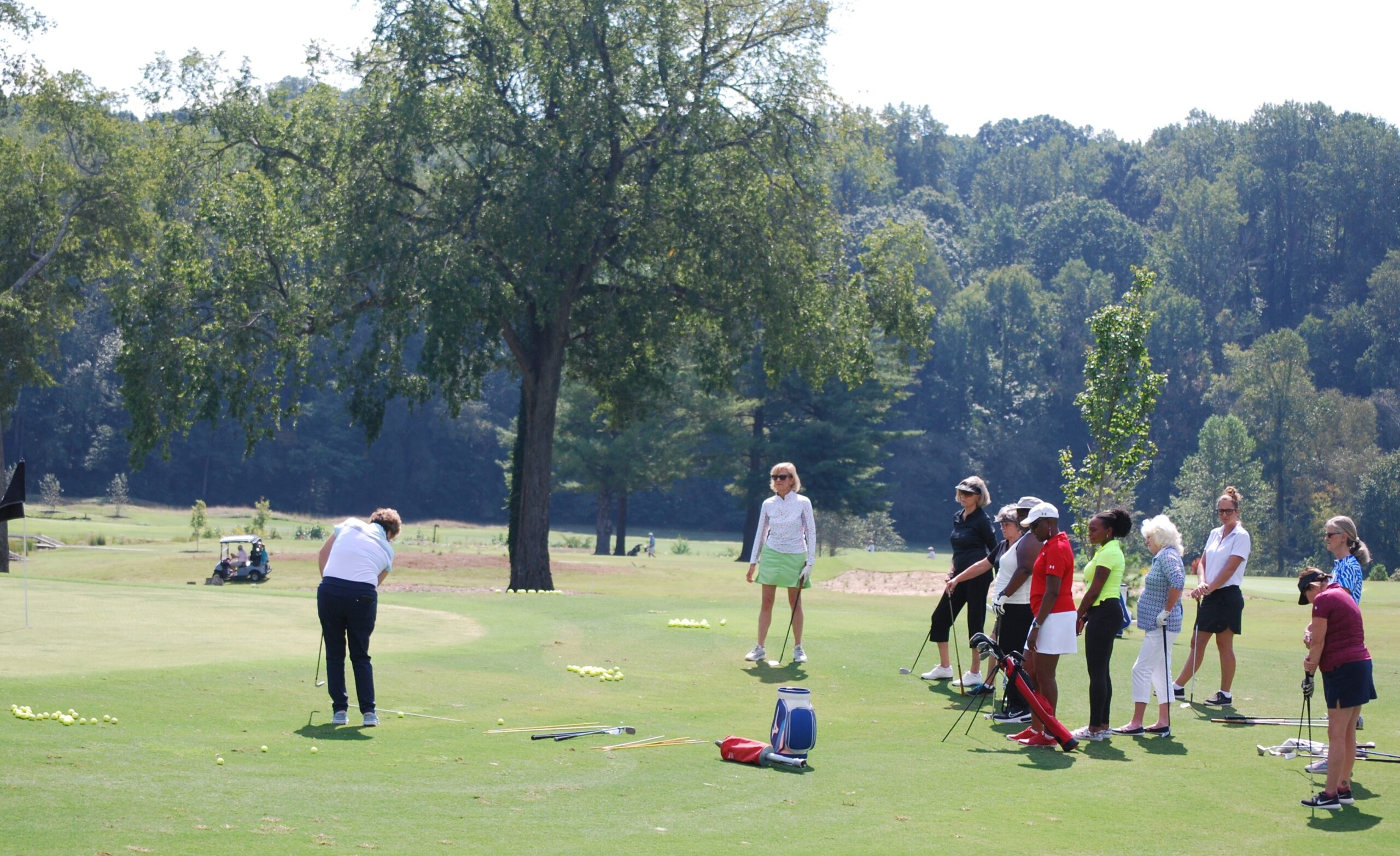
At Crosby Scholars’ 4th annual Birdies & Brunch at Maple Chase Golf and Country Club, women participated in a golf clinic led by retired Wake Forest Women’s Golf Coach Dianne Dailey, current Wake Forest Women’s Golf Coach Kim Lewellen, Bermuda Run Director of Golf Mary Thomas and Brad Luebchow, Assistant Professional at Maple Chase Golf and Country Club. Other Birdies & Brunch attendees enjoyed a health and wellness discussion led by registered dietitian Alice Smith, owner of Alice Approved.
Q&A with Wake Forest Women’s Golfer Emilia Migliaccio at 3rd Annual Birdies & Brunch
Guests at the 3rd Annual Birdies & Brunch learned why Wake Forest Women’s Golfer Emilia Migliaccio chose to return to play a fourth year at her beloved WFU, rather than turn pro, as the golf world expected.
After graduating from WFU in 2021, Migliaccio worked as a reporter and commentator for NBC’s Golf Channel. In 2022, Migliaccio returned to Wake Forest to earn a master's degree in communications.
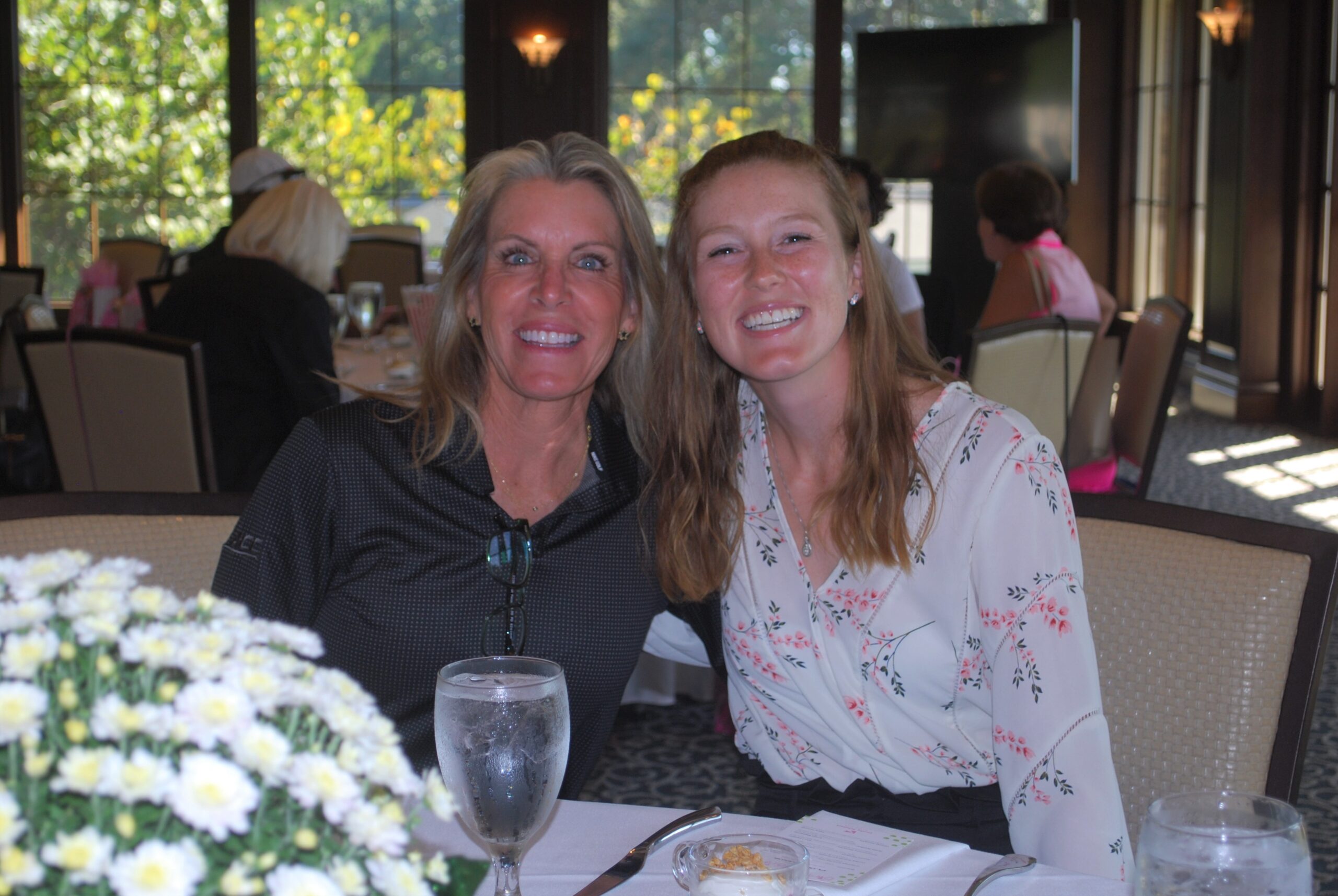
“I’ve learned how to manage my identity,” she said. “I was ready to be done. I had a year to be outside golf—and also be in golf. I recognized my love of the sport, and that propelled me to come back to Wake and play for a team I love.”
WFU Golf Coach Kim Llewelyn welcomed the chance to coach Migliaccio another year. Migliaccio was a two-time first-team All-American and a 4-time Arnold Palmer Cup team member, the only American in history to have that honor. She helped lead the Demon Deacons to the 2019 ACC title and was the individual champion. She was a gold medalist as an individual and in the mixed team event at the 2019 Pan American Games. She finished runner-up in the 2021 Augusta National Women's Amateur.
“It was a surprise to everyone she was not going to play professional golf… because of the quality of player she is,” Llewelyn said.
Migliaccio said her mother is a first-generation American from Sweden, who grew up experiencing financial stress. The family knew their children would need to move to find opportunities. One of her uncles swam for Pepperdine University, her mother played golf at the University of Arizona, and her other uncle stayed in Sweden.
“My mom taught me what it meant to be disciplined,” she said. “The sport, golf itself, taught me a lot. As I’ve gotten older, I’ve been able to understand the privilege of having a full scholarship. Student loans are stressful. I was able to focus so much more on my school and my golf.”
Llewelyn led an informal Q&A with Migliaccio during the brunch.
Llewelyn: “What made you make that decision—not to do what everyone expected you to do?”
Migliaccio: “I keep reminding myself why I became amateur. My whole life I wanted to play professionally. As I got to senior year, I had to be honest with myself about what I valued. As Americans, we love sports. When you’re in that moment, it’s day-in and day-out; your life is your sport. You’re trying to achieve peak performance. Everything you do is because of your sport—college is a perfect setting for that.
“I realized a couple of things: as much as I enjoy golf and competing, I enjoy more the college golf aspect, where I have a team and have the support. Golf is not the center of my life—that’s what needs to happen if you want to succeed professionally. I’ve competed for 15 years. Now, I’m ready to enjoy the fruits of my labor and help the industry in other ways.
“Do I regret it? The times I ask myself, ‘Could I be here?’ if I’m watching someone on television, I have to remind myself, ‘right now you’re glorifying professional athleticism.’ I have so much respect for professional athletes on a new level. It looks like they’re always playing well. It comes with a lot of hard work and struggle.”
Llewelyn: “You are a lot more professional in reference to how you approach the game. You’re different on the golf course. With this break commentating, seeing some of the best players in the world and taking the year off, what did you learn that has made you a different person on the golf course?”
Migliaccio: “This past year I worked at NBC as a writer and wrote stories for the Golf Channel. My roles were reversed. I was becoming the observer rather than the player. I was able to notice a lot of things that gave me a new perspective: How professional athletes approach their lifestyle—you can’t live and die by your results, or you will not make it; to hear how they prepare for a final round or manage a missed cut.
“I watched how they managed the course. That helped me become a better player. I learned what a growth mindset looks like—when things are not going well, how you can admit to yourself you actually are doing a lot of good things. It’s OK to say you did something well even if the result may not look that way.”
Women Get it Done at the 2nd Annual Birdies & Brunch
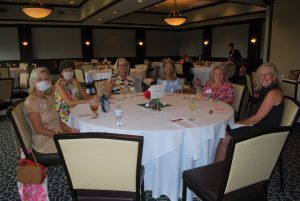 The second annual women-only Birdies & Brunch event raised more than $31,000 thanks to the generosity of women attending the fundraiser for Crosby Scholars Last Dollar Grants (LDGs).
The second annual women-only Birdies & Brunch event raised more than $31,000 thanks to the generosity of women attending the fundraiser for Crosby Scholars Last Dollar Grants (LDGs).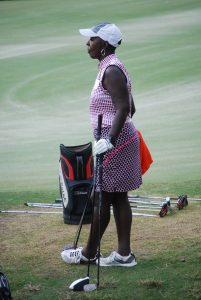
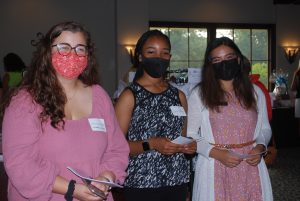 The program featured 2017 Crosby Alumnus Alese Berry, who now works at Crosby Scholars as the Program Assistant for The SHE Project.
The program featured 2017 Crosby Alumnus Alese Berry, who now works at Crosby Scholars as the Program Assistant for The SHE Project.Celebrating Title IX and Women’s Golf
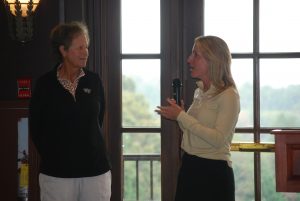
Dianne Dailey and Kim Lewellen
Crosby Scholars’ 2nd annual Birdies & Brunch provided an early preview to the 50-year anniversary of Title IX’s prohibition of sexual discrimination, thanks to a discussion between Dianne Dailey, Wake Forest University’s women’s golf coach who retired in 2018, and Kim Lewellen, the current WFU women’s golf coach.
The two coaches share mutual respect and friendship, and they discussed changes and progress they’ve experienced in women’s sports overall ― and women’s golf in particular.
Last year, Lewellen was named National Coach of the Year and has been named ACC Coach of the Year four times.
“The program is in such great hands,” Dailey said.
Lewellen said the golf program has come a long way in the 50 years since Title IX passed. WFU has six full women’s golf scholarships and has players from as far away as Switzerland, Spain, Ireland and Thailand as well as North Carolina, Florida, New Jersey and Chicago. Three of the four top WFU players are ranked 23 or higher in the world.
Progress in women’s athletics over the years “allows our women to take what they love to do and travel and make a career of it,” she said. “It’s the reason I wanted Dianne here with me. She’s a Hall of Famer. Not only is she someone that we all have looked up to who has helped grow the game and grow student athletes and women in the sport, she also had some great mentors who did the same thing.”
For Dailey, what’s most important is “how far women have come with learning the values of sports.”
“That was the one thing I always talked about when I first got there: sports can teach you so much,” she said. “They can teach life skills you need to be successful. Why would we reserve that just for men? So let’s get out there, and let’s teach these students about discipline and hard work and focus and time management and all these things that can help them be successful in careers and business.”
Dailey has enjoyed the opportunity to “not only watch the program, but those students grow to go on and be successful young women. Sport is such a great teacher of confidence. I’m so happy we are celebrating the 50th anniversary of Title IX.”
When Dailey came to WFU in 1988, the university had one full-time head coach―for basketball. The other teams were coached by assistant coaches with the men as the Director of that sport. The five original women’s sports teams – field hockey, volleyball, basketball, tennis and golf―were coached by 2 coaches. One coach had 4 teams and the women’s athletic director coached golf. . Women’s teams shared jerseys, and 25 to 30 athletes played all the sports.
“They got it started,” Dailey said. “They built that foundation for us.”
When Title IX passed in 1972, most athletic directors didn’t pay much attention, she said, and a Senator from Texas even tried to exempt athletics from Title IX. Women’s college athletics were run by an association of physical education teachers. Gladys Palmer, who was chairperson of the women’s division of Physical Education at Ohio State University, organized the first women’s golf championship in 1941.
It wasn’t until 1988 and the Civil Rights Restoration Act that things began to change. “A women’s basketball coach at Howard University sued for equal pay—and she won, and for first time in a Title IX suit the judge awarded damages,” Dailey said.
Dailey arrived at WFU in 1988 and remembers it as a watershed year, as athletic directors built facilities and added women’s sports.
“Anne Marie (Goslak, now a member of LPGA and PGA and founding Executive Director of First Tee of the Triad) was on the first team,” Dailey said. “The first semester we didn’t have a practice facility. We would hit on the soccer field, outside the lines, over the fences―and pick up balls before the soccer team practiced.”
WFU built a golf complex and the Haddock House, but Dailey didn’t have a key, so she couldn’t show it to recruits on the weekends. The players had just four shirts, four shorts, one sweater, one rain suit, golf balls and a bag. Players provided their own clubs and shoes—and golf pants.
“I never knew how many different shades of khaki there are,” Dailey said, and before a tournament at Hilton Head, the team stopped at The Gap at Tanger Outlet to make sure their pants would match. During the week-long NCAA tournaments, Dailey did laundry at night because the players only had four sets of uniforms.
“It really has come a long way,” she said. “Now we have a wonderful practice facility for both men and women, and we all have assistants.”
The Arnold Palmer Golf Complex opened in the spring of 2010, and includes the Haddock House, the Haas Family Range and the Dianne Dailey Golf Learning Center.
“It is the nicest practice facility in the country,” Dailey said, adding with a laugh, “We have people to pick up balls for us.”

